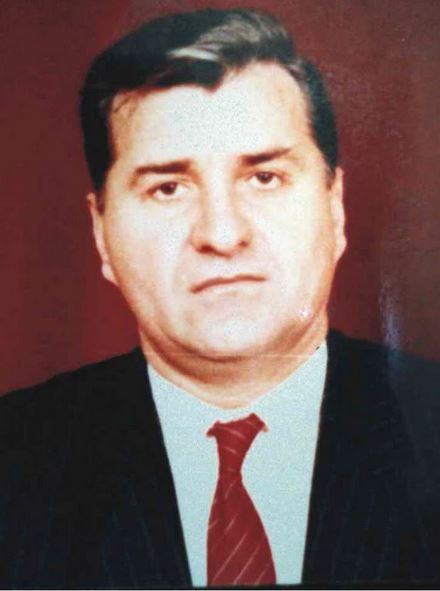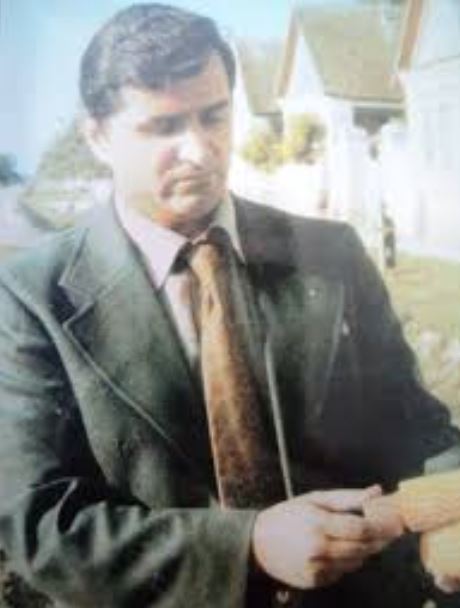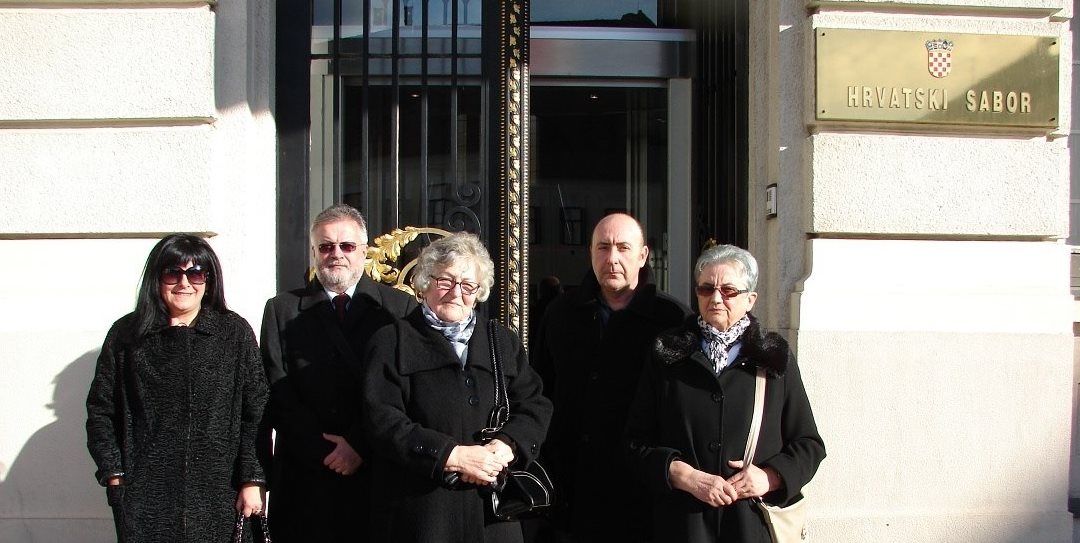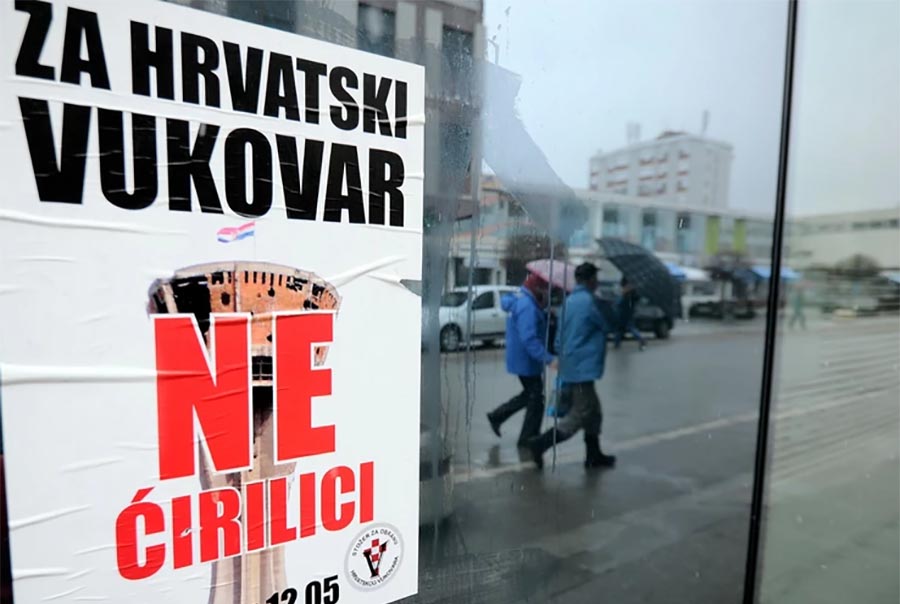Period:
Yugoslav Wars
Region:
Estern Slavonia
The Serb victim Mladen Mrkić - Vukovar 1991
Mladen Mrkić (1950–1991) was one of numerous victims of Tomislav Merčep, the self-proclaimed master of life and death in Vukovar during the spring and summer of 1991.
Mladen Mrkić, an agricultural engineer, was a conscientious worker and a good man who had no enemies.

On the day armed conflict erupted between Croatian paramilitaries and the Yugoslav People’s Army (JNA), July 31, 1991, he disappeared without a trace. It is presumed that he was murdered on the banks of the Danube and his body "sent" toward Serbia.
His wife, Radmila Mrkić, has been searching for years for any information about his disappearance, murder, and the perpetrators responsible.
Despite numerous appeals, she has only received empty promises — even from the highest-ranking officials of Serbia, Croatia, and the former SFR Yugoslavia.
The Mrkić children eventually emigrated to the United States, realizing that their homeland offered neither justice nor the rule of law.
BIOGRAPHY
Mladen Mrkić was born in 1950 in the village of Domanovići near Čapljina (Bosnia and Herzegovina). He was an agricultural engineer and director of the cooperative sector in the major regional agribusiness company VUPIK.
He graduated from the Faculty of Agriculture in Sarajevo and, after completing his studies, moved to Županja (Eastern Slavonia), where he met his future wife Radmila. The couple later relocated to Vukovar.

Mrkić found employment at VUPIK, where he worked for 15 years.
The family lived in an apartment on Gundulićeva Street in Vukovar. He was known as a decent, kind, and helpful man — a person without enemies. Even with the political upheaval and formation of Croatian paramilitary units in the early 1990s, he never considered leaving Vukovar, often saying that he had done no wrong to anyone.
THE CRIME
After the tragic events in Borovo Selo on May 2, 1991, the situation became unbearable. That incident triggered open hostilities and gave Croatian police de facto license to harass, abduct, kill, and loot at will.
Serbs who remained in Vukovar and Borovo Naselje avoided leaving their homes, fearing verbal or physical assault at any moment. A process of forced displacement had already begun.
In May 1991, the Croatian newspaper Slobodni tjednik published a public list of "dangerous" Serbs in Vukovar. Mladen Mrkić was ranked fifth on that list.
On Wednesday, July 31, 1991, after finishing his workday, engineer Mrkić left his office and stopped by a local store to buy groceries. Upon exiting the shop, he was intercepted by four members of the ZNG (Croatian National Guard), who forced him into an unmarked vehicle and took him to the Secretariat for National Defense. He was never seen again. It is presumed he was taken to the Danube and executed.
That same day, Mrkić’s wife, Radmila, was visiting her mother in the nearby village of Obudovac. She returned home around 5:30 p.m. and, realizing her husband was missing, called his colleagues — with whom he frequently returned home from work. They told her he had arrived near the building but stopped at the store. Radmila rushed to the shop and saw a plastic bag labeled "Mladen Mrkić" left on a bench. That was enough for her to suspect that he had been abducted.
She immediately went to the police, who directed her to the Secretariat for National Defense (SNO), headed at the time by Tomislav Merčep.

Merčep’s Men Could Do Anything
When Radmila arrived at Merčep’s office, he greeted her with unnatural politeness, addressing her as "Radica" and offering her a soft drink. He feigned ignorance about her husband’s abduction. The SNO then redirected her to the police, who in turn sent her back to the SNO.
That night, Radmila spent hours going back and forth between the police and the Secretariat. Due to a storm, she sought shelter in the hallway of the SNO building.
At one point, three men entered — two of whom she recognized. The third, whom she did not know, said: “Get this woman out of here!”
Realizing she had no recourse, she returned home, crying and calling her husband’s name along the way, unwilling to accept that he had been killed.
AFTERMATH
On August 1, 1991, Radmila managed to obtain the phone number of the President of the Republic of Croatia, Franjo Tuđman. When he answered, he appeared confused and asked how she had obtained his number. He then referred her to Ivan Vekić, the newly appointed Minister of the Interior. Vekić promised her that her husband would be released that same day — a promise that was never fulfilled.
She then called Vladimir Šeks, Deputy Speaker of the Croatian Parliament, in Osijek. Initially, he assumed her husband was Croatian and told her she should have contacted them earlier. But upon learning that her husband was Serbian, he hung up the phone.

The "Against Oblivion" Association
Radmila later traveled to Belgrade, where she met with Branko Kostić, a member of the Yugoslav Presidency. She recounted everything that had happened in Vukovar in 1991. He advised her to write a letter to Stjepan Mesić, then President of the SFRY. She did so, and it is known that the letter reached Mesić — but he never replied.
YEARS LATER
Years later, together with other Serbian families whose loved ones had been abducted or killed in Vukovar in 1991, Radmila Mrkić co-founded the association “Against Oblivion”, which advocates for truth and justice regarding the suffering of Serbian civilians.
For decades, Radmila has tried to uncover what happened to her husband. In November 2010, she met with Croatian President Ivo Josipović and Serbian President Boris Tadić — but the case saw no progress whatsoever.

Tadic and Josipovic in Vukovar, 1991
Their children left the country, scattered across the world, unwilling to remain in a land where there is no justice and where crimes go unpunished, while state officials continue to offer nothing but false promises.
|
WAR AND CRIMES IN VUKOVAR 1991
|
| CRIMES |
Killing of civilians * Karadzicevo * Kriva Bara
Nikolas Demonje Street * Kozaracka Road
Battle of Borovo Selo * Vukovar * Discrimination
|
| CRIMINALS |
Marko Babic * Mile Dedakovic * Zoran Šipoš
Martin Sabljic * Nikola Cibaric * Jure Marusic
Mira Dunatov * Ante Vranjkovic * Ivica Mazar
Vinko Leko * Vlado Lulic * Damir Sardjen * Dosen
Stipo Pole * Mante Mandic * Dujmovic * Raguz
Drazen Gazo * Tomislav Josic * Turbo vod
Blago Zadro * Tihomir Purda * Bartol Domazet
Madjarevic * Tomislav Mercep * Darko Mihaljevic
Zdenko Stefancic * Filkovic * Kolak * Prgomet
204th brigade * Gnezdo * Colak * Ivica Arbanas
Sandor * Franjo Vodopija * Branko Borkovic
Plavsic * Petar Kacic * Juraj Njavro * Hosovci
Damjn Samardzic * Josip Tomasic * Velimir Djerek
Ivan Poljak * Andjelic * Jurkic * Kole Kovacic
Miroslav Sucic * Zdravko Radic * Brothers Molnar
|
| CAMPS |
Drvopromet * Nova Obucara *Borovo komerc * Luzac
Ruthenian Church * Aerodrom * Jews cementary
Police Department * Pizzeria Abazia * Eltz castle
New school * Recruitment office
Kindergarten Pcelica * Municipal basement |
| VICTIMS |
Jovan Jakovljevic * Radovan Stojsic * Ana Lukic
Mladen Mrkic * Vlado Skeledzija * Miroslav Radic
Stevan Inic * Darinka Grujic * Ljuban Vucinic
Zeljko Pajic * Milica Vracaric * Mirko Pojatic
Milenko Djuricic * Zoran Filipovic * Bosko Grbic
Ilija Lozancic * Stevo Malecki * Branko Mirjanic
Predrag Ciric * Sucevic * Ljubomir Bolic
Slavko Miodrag * Milan Vezmar * Marko Tolic
Sveto Nedeljkovic * Nedeljko Zunic
|
|
PUBLICAT.
|
Vuteks brand * Ovcara VS Dudik * Zvonko Ostojic
Milanovic and Plenkovic * Bloodsuckers of Sajmiste
Unspoken things * Autochauvinism * Terms confusion
Not admitting the crime * Vukovar through the centuries
Transcripts * Slavonian Napoleon
One-sided past * Hypocrisy in judgments
|
CONCLUSION
The case of Jovan Jakovljević is but one instance in a broader chain of crimes committed against Serbs in the Vukovar municipality in 1991. Similar unlawful acts occurred in other parts of the Socialist Republic of Croatia, including Zagreb, Split, Karlovac, Gospić, Sisak, Virovitica, Nova Gradiška, Osijek, Rijeka, Zadar, Šibenik, Ogulin, and beyond.
From the moment he assumed power in May 1990, Franjo Tuđman’s regime pursued the secession of Croatia from Yugoslavia, and the ensuing war served as a tool for the ethnic cleansing of Serbs from the newly proclaimed state. In this endeavor, Tuđman received substantial support from member states of the European Union and the NATO alliance, who throughout the 1990s consistently backed Croatia in the disintegration of the Socialist Federal Republic of Yugoslavia.
For decades, the Croatian judicial system has systematically obstructed investigations and criminal proceedings in cases where the victims were of Serb ethnicity. Any convictions in such cases would significantly alter the dominant narrative of the so-called Homeland War (Domovinski rat) by demonstrating that Serbs, too, were victims, and that Croats were among the perpetrators of crimes.

Hate speech - Croats agaist cirilica
Given the widespread portrayal of Serbs throughout the Western world as the sole culprits for the breakup of Yugoslavia and the wars that followed, it is difficult to believe that anyone will ever be held accountable for heinous crimes such as the murder of Jovan Jakovljević, a Serbian civilian in Vukovar.
Tags:
Please, vote for this article:
Visited: 604 point
Number of votes: 0
|